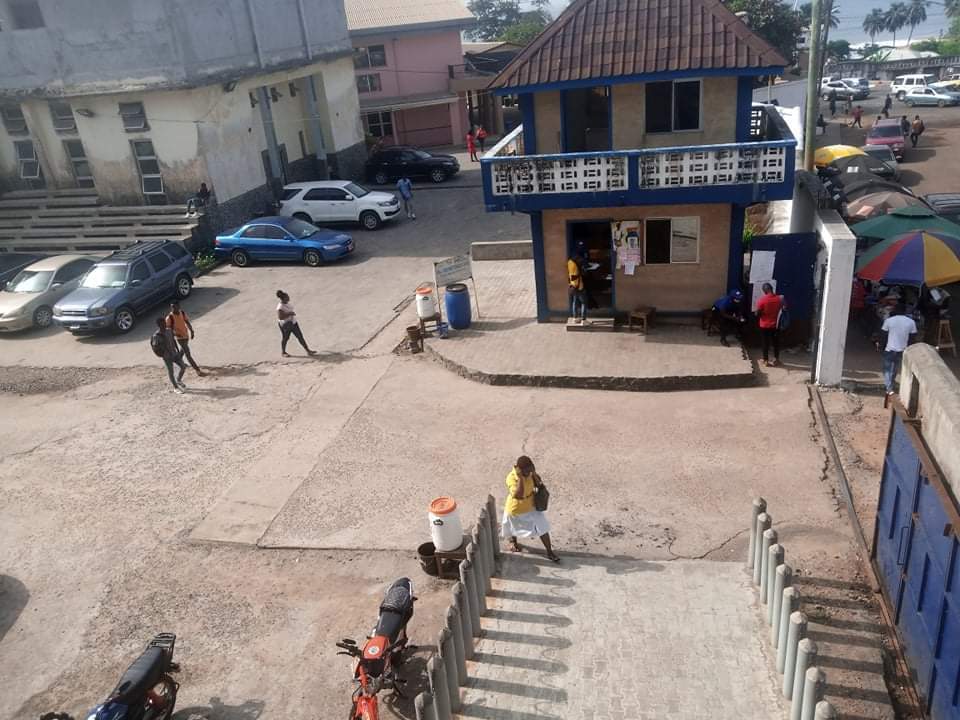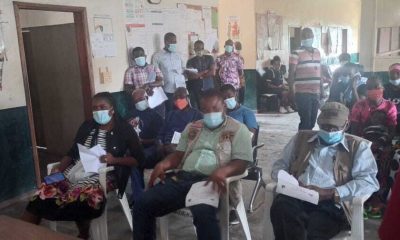
Monrovia – Abraham W. Jackson is ready to take the COVID-19 vaccine. He’s ignoring the many misinformation about taking the jab. But the threat of misinformation still looms, dissuading many others from getting inoculated.
Report By: Aria Deemie, Inspires Health Reporting Fellow
Amongst several vaccine misinformation, one has it that “people who take the vaccine will die after two years”. This myth has since been dismissed by the public health experts from across the world, and the 22-year-old Johnsonville resident is very much aware of the benefits of getting immunized against COVID-19.
“I believe it’s worth taking and others around the globe have been taking it, and their health is still normal,” Jackson said.
“I see this vaccine as an opportunity and I’m willing to take the advantage. Can’t mind the rumors and risk my life considering the damage this virus is causing.

Jackson (pictured) is confident that the vaccine will protect him against COVID-19
“We shouldn’t be fooled by those speculations that the coronavirus vaccine is poisonous, harmful to health and causes blood clots — for the fact that those rumors are not proven they are not true”.
Emmanuel Melchizedek Sarwleeh, 27, a resident of St. Paul Bridge Community, agrees with Jackson. He adds that the vaccine is “a great help” to end COVID-19.
“I have read on the vaccine and it’s safe to be taken,” he said. “The health ministry needs to create more jingles (messages) to clear the air about the lies many people carrying around that the vaccine isn’t safe. This is what scaring many away from taking the vaccine.
“To those who are afraid to take the vaccine, because of the lies that are circulating around, this vaccine is safe; it can’t kill. Don’t allow people to deceive you. Taking this vaccine will help you to not come down with the virus.”
And Nerese Pinky Farr, a resident of Dagbwe town, added: “If the vaccine is available in Liberia, I will take it”. Farr is confident that the “vaccine has been tested and proven safe by World Health Organization”
Almost 237,000 Now Vaccinated
In July, The National Public Health Institute of Liberia stated that less than two percent of Liberians had taken at least one dose of the COVID-19 vaccine. The statistics were released at the time when the country was grappling with a new wave of COVID-19 infections.
The data show that 94,800 people received their first doses of the Oxford-AstraZeneca vaccine – this accounted for just 1.895% of the country’s population of an estimated at 5 million. By then at least 6,120 people had received two doses of the AstraZeneca vaccine — accounting for 0.12% of the population.
This number of people who have taken the vaccine since July has more than double. By the end of August, 236, 861 people were already vaccinated, according to Mr. Adolphus Clarke — head of vaccination at the Ministry of Health — during an interview with LocalVoicesLiberia.
Vaccines have been recommended by the World Health Organization (WHO) and the United States’ Centers for Disease Control and Prevention (CDC) as very effective against COVID-19 — especially preventing severe illness and death.
There have been two new consignments of vaccines – AstraZeneca and Johnson & Johnson – brought to the country through the COVAX facility – a global partnership seeking to make vaccine available to low-income country.
Vaccine Fear, Misinformation Still Linger
But some people want to stay unvaccinated due to fear of the side effects. Some claim the vaccine may cause health complications although this concern has been allayed by medical experts who say that the side effects are minor.
However, Thomas Nyahn, 25, thinks that the vaccine is not for young people. “According to what I have studied, the vaccine is not actually meant for younger people who are below age 35 and that is why young people have a higher chance of surviving the virus if infected,” he said.
Nevertheless, Nyahn is aware that the vaccine provides “good” immunity against the virus. “We have different resistance and health conditions, so if it’s necessary you can take the vaccine and let’s continue to follow preventive measures,” he added.
Amram Cooper,19, of the ELWA Rock Crusher community, doesn’t think the vaccine is reliable.
“What if it’s just an experiment and is not reliable? What will become of those who have taken it already? For these and many more, I won’t take the vaccine,” he said.
For 21-year-old Faith D. Solo, she prefers social distancing and wearing mask to getting vaccinated.
“You can get Covid even if you are vaccinated; so, it’s preferable that I follow the preventive measures than to take the Covid vaccine,” she said.

Faith (pictured) says she prefers following the preventive measures to taking the vaccine
And Fatu M. Kelley,20, insists that she won’t take the vaccine because of “what I have been hearing” about it.
“Health workers are saying you have to be very well in your body before taking the vaccine otherwise the vaccine will react on you very badly, because of this, I’m scared to take the vaccine,” she said.
Vaccine Benefits Outweigh Side Effect
The World Health Organization continue to advice that COVID-19 vaccines are safe for most people 18 years and disorder including those with pre-existing conditions of any kind, including auto-immune disorders. The WHO also suggests that people with hypertension, diabetes, asthma, pulmonary, liver and kidney disease, as well as chronic infections that are stable and controlled are qualified to take the vaccine.
And Mr. Clarke, the MoH head of immunization, says taking COVID-19 vaccine prevents severe illness, reduces hospitalization and death.
“People who are vaccinated — not that they’re not likely to get sick or come in contact with the disease — but if they come in contact with the disease, it’s not going to treat them severely compared to someone who has not taken the vaccine,” Mr. Clarke said.
Also, the CDC recommends that to receive the most protection, people must get fully vaccinated. Some people who are fully vaccinated against COVID-19 will still get sick because no vaccine is 100% effective, but it prevents death and severe illness, according to the CDC.
Responding to fear and misinformation about the vaccines’ side effects, Mr. Clarke stressed that vaccine, like many other medications, have side effects but clarified that the benefits of taking the COVID-19 vaccine outweigh the side effects.
“Some people who take the vaccine have fever, some have headache, experience nausea or weakness — the reaction will differ from person to person,” explains the Head of Immunization of the Ministry of Health, adding that there have been efforts to dispel vaccine misinformation.
“Some of the people once we talk to them and try to explain, they instantly make the decision to get vaccinated.
Clarke disclosed that there are ongoing community engagements, interpersonal communication interaction, social behavior change, and the use of multiple channels to create awareness about the vaccine.
“Even if we’re not able to reach out to you and you have concerns, our doors are open at the Ministry of Health, we have hotlines the 4455,” he added.
Aria Deemie is a practicing Liberian journalist, who is studying social work at the Mother Patern College of Health Sciences in Monrovia. She has acquired training from the SheWrites; SheLeads journalism mentorship program and LocalvoicesLiberia Media Network. Aria seeks to bring to light issues that have been withheld in the dark. She hopes to speak to the conscience of perpetrators of human rights abuses through her reports.


Methodology

True
The claim is rigorous and the content is demonstrably true.

Half True
The statement is correct, although it needs clarification additional information or context.

Unproven
Evidence publicly available neither proves nor disproves the claim. More research is needed.

Misleading
The statement contains correct data, but ignores very important elements or is mixed with incorrect data giving a different, inaccurate or false impression.

False
The claim is inaccurate according to the best evidence publicly available at this time.

Retraction
Upon further investigation of the claim, a different conclusion was determined leading to the removal of the initial determination.

Toxic
A rude, disrespectful, or unreasonable comment that is somewhat likely to make you leave a discussion or give up on sharing your perspective. Based on algorithmic detection of issues around toxicity, obscenity, threats, insults, and hate speech;

































































































































































































































































































































































































































































































































































































